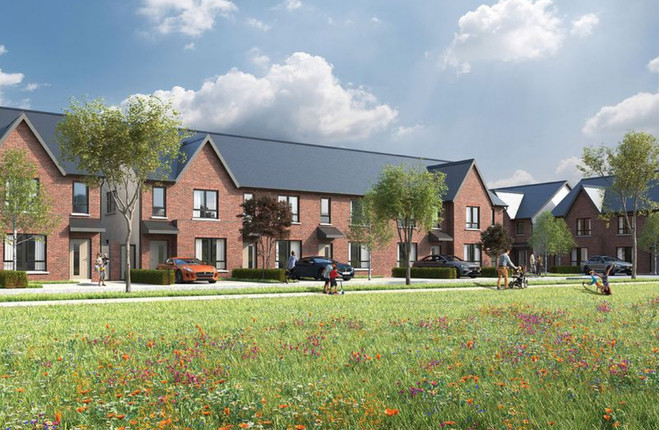Rynair purchasing 25 new homes in Swords has divided opinion.
Critics say it is endemic of the current housing crisis in Ireland, while the other side of the issue see it as the market functioning as intended and Ryanair are acting in the best interests of their workers.
The airline purchased 25 homes in Fosterstown Place to serve as accommodation for their cabin crew.
In a statement, the airline said “in recent years the absence of affordable rental accommodation has been a major impediment to recruiting and training new Irish and European cabin crew members to Ryanair’s in-flight team.”
They said the bulk purchase was carried out “in order to ensure that it can provide high-quality but affordable rentals close to Dublin Airport for new cabin crew who are joining Ryanair and to help us maintain Ryanair’s flight schedules for up to 33 Dublin aircraft.”
The scheme is made up of three- and four-bed family homes and is located is 2km south of Swords village and 3.5km north of Dublin Airport.
“This accommodation, which is located one bus stop from Dublin Airport, will be rented at affordable rates to Ryanair cabin crew during their first year of employment.”
The story, first reported by Killian Woods in the Business Post, has touched off a firestorm with elected representatives saying it represents a failure of current Government housing policy.
Social Democrats TD and housing spokesperson Cian O’Callaghan said the move was a “kick in the teeth” for first-time buyers.
“It is already hard enough for people looking to get a place of their own when rents are at the highest ever level and house prices are 6% above their Celtic Tiger peak.”
“Add to that, having to bid against international investment funds and global companies, and it is no wonder there are over half a million adults are stuck living in their childhood bedrooms.”
Figures from the Irish Times note that while Ryanair did not disclose how much they were paying for the homes, the current market rates place the purchase between €8.5 million and €10 million.
O’Callaghan said that while people are “shocked” at Ryanair’s entry into the property market, he said “stories like this do not take place in a vacuum.”
“The only reason Ryanair are buying up homes is because their workers cannot find a place to live; large corporations should not have to enter the property market in a desperate bid to house their staff.”
“This Government is presiding over a dysfunctional housing system that rolls over for giant corporations but offers little hope to ordinary people.”
Local Independents4Change councillor Dean Mulligan told the Irish Independent that Ryanair bought the houses “the same way a vulture fund would buy them.”
He said that Ryanair stepping in to purchase property for their workers is a symptom of how poor the Irish housing market is.
“In order to retain staff and get staff in, they need to go buy housing in an area – that highlights how dire the housing situation is.”
He said that many couples and young families in the local area were on a waiting list for the same site.
“I acknowledge their workers deserve and should have a roof over their heads, but it’s a bit of a slap in the face to the local residents.”
Minister for Housing Darragh O’Brien said that it was 25 homes out of a large estate being bought and there was reason to be “optimistic” about the move.
He noted that Ryanair are obligated to pay 10% stamp duty on the homes, and that in this particular context planning law changes, which allowed Fingal County Council to designate up to 50% of developments for individual buyers, only applied to planning permissions made before May 2021.
Eoin O’Malley, social scientist at DCU said “it will be interesting to see the reaction to this; are they (Ryanair) the same as ‘vultures’, are they good employers like Guinness, is this ‘late-stage capitalism’ controlling their employees’ lives, or is it just Ryanair trying to solve a problem in a practical way?”
Michael Dowling, a finance lecturer at DCU said “why exactly should this ‘not be allowed to happen’? The average Ryanair worker is a flight attendant in a low-income bracket.”
“It feels like a social good they are now able to rent affordable accommodation near where they work,” he noted.
